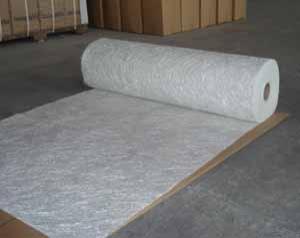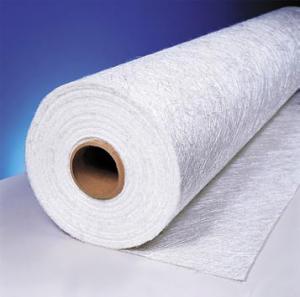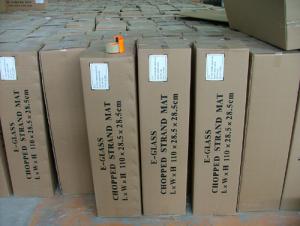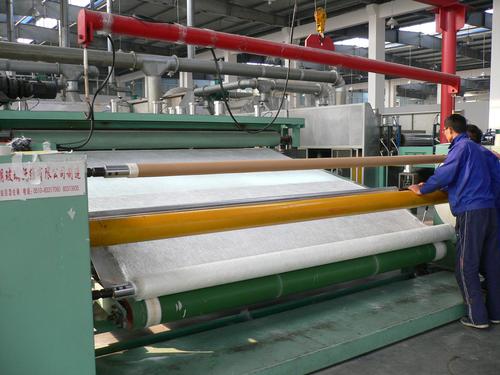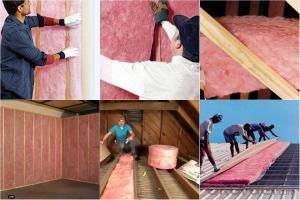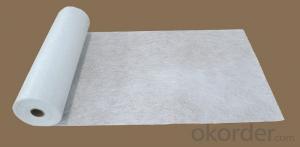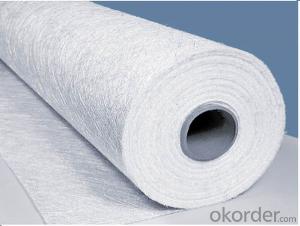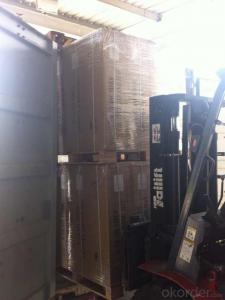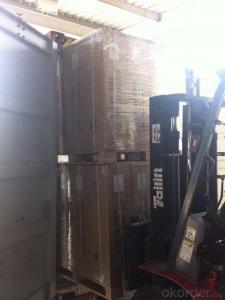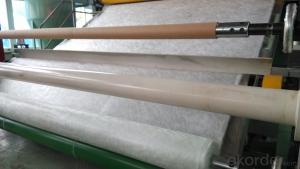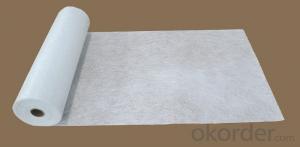Fiberglass Mat Tissue E-Glass Chopped Strand Mat Emulsion Bonded
- Loading Port:
- China Main Port
- Payment Terms:
- TT or LC
- Min Order Qty:
- -
- Supply Capability:
- 1500ton m²/month
OKorder Service Pledge
OKorder Financial Service
You Might Also Like
Emulsion Binder E glass Chopped Strand Mat
Product description of Fiber Glass Powder Emulsion Chopped Strand Mat
Glass Fiber Emulsion Binder Chopped Strand Mat is an unwoven fabrics consisting of randomly distributed chopped strands held together with Emulsion Binder.
Emulsion Binder Chopped Strand Mats are compatible with unsaturated polyester, vinyl ester, phenol and epoxy resins.
The products are widely used in hand lay-up process and can also be used in compression molding and continuous laminating process and hand layup process. The typical end-use applications include various panels, boats, bathroom accessories, automotive parts and cooling towers.
Specification of Emulsion Binder E-Glass Chopped Strand Mat
Property Glass type Weight(g/m2) Width 200~3300 Roll Weight Moisture Content /% Combustible Content /% Breakage Strength /N Test Method GB/T 1549 ISO3374:2000 ISO3374 GB/T17470-1998 ISO3344:1997 ISO1887:1995 ISO3342 EMC 80 E-GLASS 80±16 ±5 6~50 <0.2 13.6±0.35 ≥200 EMC 100 E-GLASS 100±10 ±5 6~65 <0.2 9.5±0.35 ≥170 EMC 150 E-GLASS 150±15 ±5 6~97 <0.2 8.0±0.35 ≥40 EMC 225 E-GLASS 225±22 ±5 6~150 <0.2 5.0±0.6 ≥60 EMC 300 E-GLASS 300±30 ±5 6~180 <0.2 4.0±0.6 ≥90 EMC 450 E-GLASS 450±45 ±5 6~180 <0.2 3.8±0.6 ≥120 EMC 600 E-GLASS 600±60 ±5 6~240 <0.2 3.6±0.6 ≥150 EMC 900 E-GLASS 900±90 ±5 6~190 <0.2 3.4±0.6 ≥180
Characteristics of Emulsion Binder E Glass Chopped Strand Mat
1.Uniform density ensures consistent fiberglass content and mechanical properties of the composites products;
2.Uniform powder distribution ensures good mat integrity, little loose fibers and small roll diameter;
3.Excellent flexibility ensures good mold ability with no spring back at sharp angles;
4.Fast and consistent wet-out speed in resins and rapid air lease reduce resin consumption and production cost, and enhances productivity and mechanical properties of the end products.
5, The composite products have high dry and wet tensile strength and good transparency.
6, Optional for high strength with stiff mat for panel laminating and midle strength with soft mat for hand layup.
Package:
1, the Mat roll will be wrapped in PVC/PE film, then packed with carton boxes;
2, Vertically placed on bottom pallets by:
4 rolls*4 rolls or 4 rolls* 5rolls
Horizontally placed on upper pallets by:
3 rolls*4 rolls
3, the whole pallet will be fasten by PVC strips;
4, the whole pallets will be wrapped by strentchable PE film.
FAQ:
1. Why Choose us?
CNBM is a stated own company, provide the guarantee for the best quality, best service and safety business. 2. How will we guarantee the quality? a, ISO 9001-2008 quality control system; b, Strict and regular quality control in production; c, Inspeciation when loading into container before shippment; d, Sample stock for one year for quality tracing and record. 3. What is your MOQ? Our MOQ is one pallet. 4. Can you provide sample? Yes, we can offer free sample for you. 5. Payment terms? We can accept L/C, T/T etc. 6. Do you offer OEM service? Yes, we can print customers’ logo on the packaging; And the size and specification can be produced and design according to your demand. 7. What is the Production Lead Time? 1 *40HQ each day.
8. What kind of standard of the mat?
ISO9001-2008
GS Certificate (special for automotive industries)
DNV Certificate (Special for Marine)
LIyod
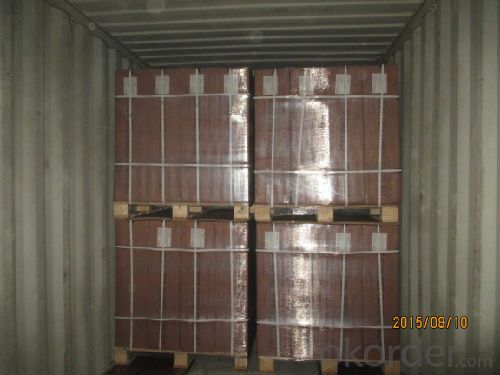
- Q: What is the impact resistance of fiberglass mat tissue at high temperatures?
- The impact resistance of fiberglass mat tissue can vary at high temperatures, depending on factors like its specific composition, the manufacturing process, and the testing conditions. In general, fiberglass mat tissue has good impact resistance at high temperatures due to the inherent strength and durability of fiberglass materials. Fiberglass is recognized for its excellent mechanical properties, including high tensile strength and stiffness, which contribute to its overall impact resistance. Typically, fiberglass mat tissue maintains its structural integrity and can withstand impact without cracking or breaking at high temperatures. This is because the fiberglass fibers are designed to endure high temperatures and do not easily soften or deform. However, it's worth noting that the impact resistance of fiberglass mat tissue can be affected by other factors like the presence of additives or binders used during manufacturing. Some additives or binders may decrease impact resistance or make the tissue more prone to damage at high temperatures. To determine the specific impact resistance of a particular fiberglass mat tissue at high temperatures, it's crucial to refer to the manufacturer's specifications or conduct specific tests under controlled conditions. These tests can provide more precise information on how the material will perform under impact at elevated temperatures.
- Q: What is the typical width of fiberglass mat tissue rolls?
- The typical width of fiberglass mat tissue rolls is around 1 meter or 3 feet.
- Q: Is fiberglass mat tissue resistant to moisture vapor transmission?
- Yes, fiberglass mat tissue is resistant to moisture vapor transmission.
- Q: Can fiberglass mat tissue be used for marine applications?
- Yes, fiberglass mat tissue can be used for marine applications. Fiberglass mat tissue is commonly used in the marine industry for various purposes such as boat construction, repairs, and maintenance. It provides excellent strength, durability, and resistance to water, making it an ideal material for marine applications. Fiberglass mat tissue is lightweight, easy to work with, and can be easily molded or shaped to fit specific requirements. It is also resistant to corrosion from saltwater and other harsh marine environments. Overall, fiberglass mat tissue is a reliable and versatile material that is commonly used in the marine industry.
- Q: What is the thermal resistance of fiberglass mat tissue?
- The thermal resistance of fiberglass mat tissue depends on various factors such as the thickness of the mat, the density of the fibers, and the presence of any additional materials or coatings. Generally, fiberglass has a low thermal resistance, meaning it is a good conductor of heat. However, when used as insulation, the thickness and density of the fiberglass mat can increase its thermal resistance, making it more effective at reducing heat transfer. It is important to note that specific values for thermal resistance can vary depending on the specific product and application, so it is recommended to consult the manufacturer's specifications for accurate information.
- Q: What is the expected lifespan of fiberglass mat tissue in chemical storage applications?
- The expected lifespan of fiberglass mat tissue in chemical storage applications can vary depending on factors such as the specific chemicals being stored, the conditions of storage (temperature, humidity, etc.), and the quality of the fiberglass material. However, fiberglass mat tissue is generally known for its durability and resistance to corrosion, making it suitable for long-term use in chemical storage applications. With proper maintenance and care, it can typically last for many years.
- Q: Can fiberglass mat tissue be used for roofing applications?
- Yes, fiberglass mat tissue can be used for roofing applications. It is commonly used as a reinforcement material for roofing systems, providing added strength and durability. It helps to prevent cracking and increase the overall lifespan of the roof.
- Q: What are the potential health hazards associated with working with fiberglass mat tissue?
- Working with fiberglass mat tissue can pose several potential health hazards due to the nature of the material. One primary concern is the inhalation of fiberglass particles, which can cause respiratory issues. When fiberglass is cut or handled, it releases small particles into the air that can be easily inhaled. Prolonged exposure to these particles may lead to throat and lung irritation, coughing, and difficulty breathing. Another potential health hazard associated with fiberglass mat tissue is skin irritation. The tiny fibers from the material can irritate the skin upon contact, causing redness, itching, and rashes. In some cases, prolonged exposure or repeated contact with fiberglass can result in more severe skin conditions such as dermatitis. Furthermore, fiberglass mat tissue can also cause eye irritation and damage. If fibers come into contact with the eyes, they can cause redness, itching, watering, and even corneal abrasions. It is important to wear appropriate eye protection, such as goggles, to prevent any potential eye injuries while working with fiberglass. To mitigate these potential health hazards, it is crucial to follow safety guidelines and use personal protective equipment (PPE) when working with fiberglass mat tissue. This includes wearing a respirator mask to prevent inhalation of particles, using gloves and protective clothing to minimize skin contact, and wearing safety goggles to protect the eyes. Regular cleaning and good hygiene practices are also essential to minimize any potential health risks associated with fiberglass. It is important to clean work areas properly to remove any loose fibers, and to wash hands and exposed skin thoroughly after working with fiberglass. Overall, while working with fiberglass mat tissue can present potential health hazards, taking appropriate safety precautions and following safety guidelines can significantly reduce the risk of any adverse health effects.
- Q: How is fiberglass mat tissue bonded to surfaces?
- Adhesive materials are commonly utilized to bond fiberglass mat tissue to surfaces. To initiate the bonding process, the adhesive is applied onto the surface where the fiberglass mat tissue will be attached. Typically, a two-part epoxy resin or a specialized fiberglass adhesive, specifically formulated for bonding fiberglass materials, is used. Following the manufacturer's instructions, the adhesive is thoroughly mixed and then evenly spread onto the surface using a brush, roller, or trowel. With utmost care, the fiberglass mat tissue is then placed onto the adhesive-covered surface and firmly pressed down to ensure optimal adhesion. Subsequently, the adhesive is left to cure for the recommended duration, allowing it to solidify and establish a robust bond between the fiberglass mat tissue and the surface. This bonding technique guarantees the secure attachment of the fiberglass mat tissue to the surface, offering reinforcement, protection, or other desired attributes based on the specific application.
- Q: What is the maximum temperature that fiberglass mat tissue can withstand?
- The maximum temperature that fiberglass mat tissue can typically withstand is around 600-700 degrees Celsius.
Send your message to us
Fiberglass Mat Tissue E-Glass Chopped Strand Mat Emulsion Bonded
- Loading Port:
- China Main Port
- Payment Terms:
- TT or LC
- Min Order Qty:
- -
- Supply Capability:
- 1500ton m²/month
OKorder Service Pledge
OKorder Financial Service
Similar products
Hot products
Hot Searches
Related keywords

